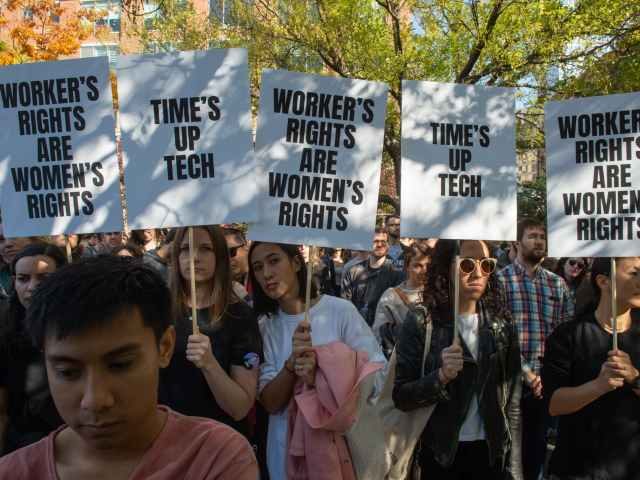In an article for the New Republic last week, two writers noted that the mainstream media has failed to register the shift in Silicon Valley from libertarianism to leftism.
The article, titled, “The Stark Political Divide Between Tech CEOs and Their Employees,” questioned whether Silicon Valley was “growing away from its liberal and libertarian origins.”
“As we usually understand them, workers are not ‘creatives,’ inspired by a higher calling. Most people are workers by necessity, and sell their labor to make a living. By calling themselves workers, members of the new movement are staking a claim to this common identity,” declared Moira Weigel and Ben Tarnoff in their evaluation of the difference between Big Tech executives and employees. “This common identity, in turn, has enabled tech workers to build alliances across roles with the shuttle drivers, security guards, janitors, and cafeteria staff who make up the industry’s ‘invisible workforce.'”
“These members of the new tech worker movement don’t sound like the ‘hippie yuppies’ of the Californian Ideology. They are embracing a more collective, worker-driven politics—one that owes less to Ayn Rand than it does to Eugene Debs,” Weigel and Tarnoff claimed. “Until recently, media outlets have failed to register this shift, because they have let tech executives speak for the industry as a whole.”
Referencing recent union action and protests at Big Tech companies, including the mass employee protests against Google’s response to complaints of sexual misconduct at the company, Weigel and Tarnoff also claimed that media “analyses fail to register that the tech worker movements are creating a new paradigm—a paradigm that breaks with the mix of libertarian anti-statism and hippie-inflected liberalism that continues to dominate tech’s leadership class.”
“The leaders of the tech worker movement are making a new and paradoxical gambit—that by claiming a common identity as workers, they can exercise their special power. Rather than waiting to be saved by CEOs, they are threatening the profit engine,” they concluded. “They are betting that when tech workers who are expensive to hire and train join in collective action, CEOs must pay attention.”
Charlie Nash is a reporter for Breitbart Tech. You can follow him on Twitter @MrNashington, or like his page at Facebook.

COMMENTS
Please let us know if you're having issues with commenting.